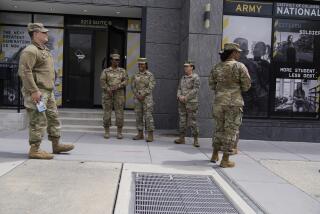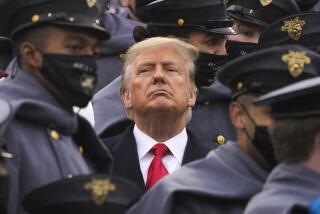Uncle Sam needs more
- Share via
WHEN PRESIDENT BUSH announced after the election that he was replacing Secretary of Defense Donald H. Rumsfeld with Robert M. Gates, he promised that Gates would bring a “fresh perspective” to the Pentagon. The assumption was that Bush was referring to Iraq. But this week, Bush indicated that the biggest difference between the Rumsfeld and Gates eras may involve the size of the U.S. military over the next several years.
Bigger, Bush now seems to believe, is better. Amplifying an earlier comment in an interview with the Washington Post, the president said at a news conference Wednesday that “I’m inclined to believe that we need to increase ... the permanent size of both the United States Army and the United States Marines.”
Bush is right -- regardless of what one thinks of the separate issue of whether he should approve a short-term “surge” in U.S. forces in Iraq to stabilize Baghdad. But the president will have to do a better job of explaining why this country needs a bigger military establishment.
On Wednesday, Bush couched his argument in excessively narrow terms, saying that a beefed-up military was necessary to prosecute the “war on terror [that] is the calling of a new generation.” This argument jumbles together the (at least partly metaphorical) “war on terror” -- a many-fronted effort to prevent the repetition of the attacks of Sept. 11, 2001 -- with the amassing and deployment of military forces around the globe to protect all of the nation’s vital interests.
Of course, the war on terror is one of the threats tying up resources. It took a conventional military operation in Afghanistan to topple Al Qaeda’s Taliban patrons (and that one was fought on the cheap, relying mainly on Afghan warlords as U.S. surrogates). Further, opponents of a precipitous U.S. withdrawal from Iraq -- including Bush -- argue that a pullout would embolden terrorists there and elsewhere.
The need for a larger military isn’t confined to the Iraq war but to any number of possibilities -- war on the Korean peninsula, genocide in Africa, the defense of Israel, you name it.
Hence, the case for repudiating the “leaner, meaner” posture identified with Rumsfeld -- who presided over a slight reduction in active-duty military personnel despite engagements in Afghanistan and Iraq -- transcends today’s debates. Critics in both parties (and with a variety of views on Iraq) have supported an increase in the permanent size of the armed forces to increase flexibility in future crises, shorten tours of duty, ease the burden on military families and rely less on the Reserves and National Guard, which to some degree have been turned into a full-time fighting force.
The U.S. remains the world’s sole superpower, but the nation no longer has enough men and women under arms to shoulder its responsibilities. By that we don’t mean ill-conceived adventures like the war in Iraq, but the preparedness to react to unforeseen crises. One reason the armed forces are too small is that the Pentagon’s military-industrial complex favors spending money on costly gadgetry, some of it unnecessary, over such prosaic things as a foot soldier’s pay. But the scary truth is that with roughly 150,000 troops tied down in Iraq, the U.S. is hardly in a position to react effectively to a major crisis elsewhere.
A significant increase in soldiers and Marines could be accomplished with ramped-up recruiting and pay incentives. In testimony to Congress last week, Army Chief of Staff Gen. Peter J. Schoomaker suggested that his branch of the service could efficiently add up to 7,000 troops a year. Many such increases could take place without the current size of the Army (507,000) approaching the level of the 1991 Persian Gulf War (780,000). Secretary Gates should be more aggressive and advocate the addition of 100,000 more troops, which would cost in the neighborhood of $20 billion -- not an exorbitant amount in Pentagon terms.
There is no need for a draft. Better pay and incentives may be needed to entice more people to join, but there are more than 60 million Americans between the ages of 18 and 35 to recruit from.
To understand why an Army of half a million troops is inadequate, you have to consider that only about two-thirds of that number can be deployed overseas, and not all of those can be sent to trouble spots simultaneously. Ideally, military convention holds, you rotate active-duty combat troops in such a way that they get plenty of training and time with their families. Do the math, and you realize why the 150,000 troops stationed in Iraq are such a strain on the Pentagon.
What’s worse, all that strain -- the added burden on reserves, the training shortcuts, the extended tours of duty -- translates into poor morale, which makes it difficult to recruit more troops. It’s a Catch-22. And again, this should not be a partisan issue. Along with GOP Sen. John McCain, Democratic Sens. John Kerry and Hillary Rodham Clinton have been calling for a larger military for some time.
Until recently, the White House has been cool to such calls. A year ago, reflecting Rumsfeld’s thinking, Secretary of the Army Francis J. Harvey assured Congress that his branch of the services would be able to roll back a temporary increase of 30,000 troops authorized in 2004, increasing available combat units through reorganization.
Bush took office disdainful of nation-building exercises and skeptical of the types of humanitarian interventions the military engaged in during the 1990s, and that is partly why this administration was reluctant to build troop strength. Bush’s second thoughts are long overdue, even if he isn’t doing his cause justice by simply pointing to the war on terror as his rationale.
More to Read
Get the L.A. Times Politics newsletter
Deeply reported insights into legislation, politics and policy from Sacramento, Washington and beyond. In your inbox three times per week.
You may occasionally receive promotional content from the Los Angeles Times.










